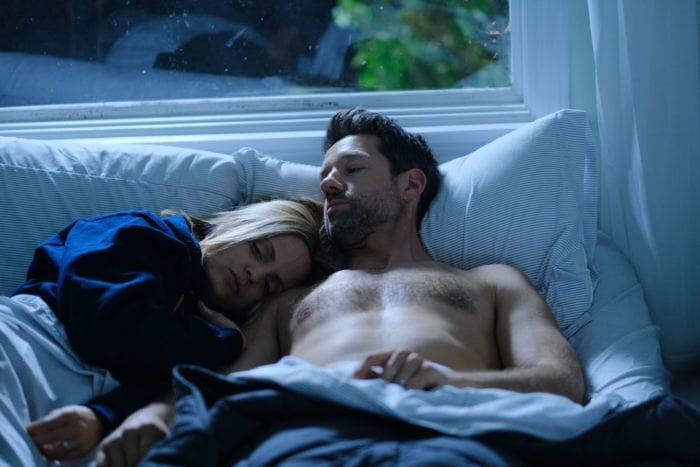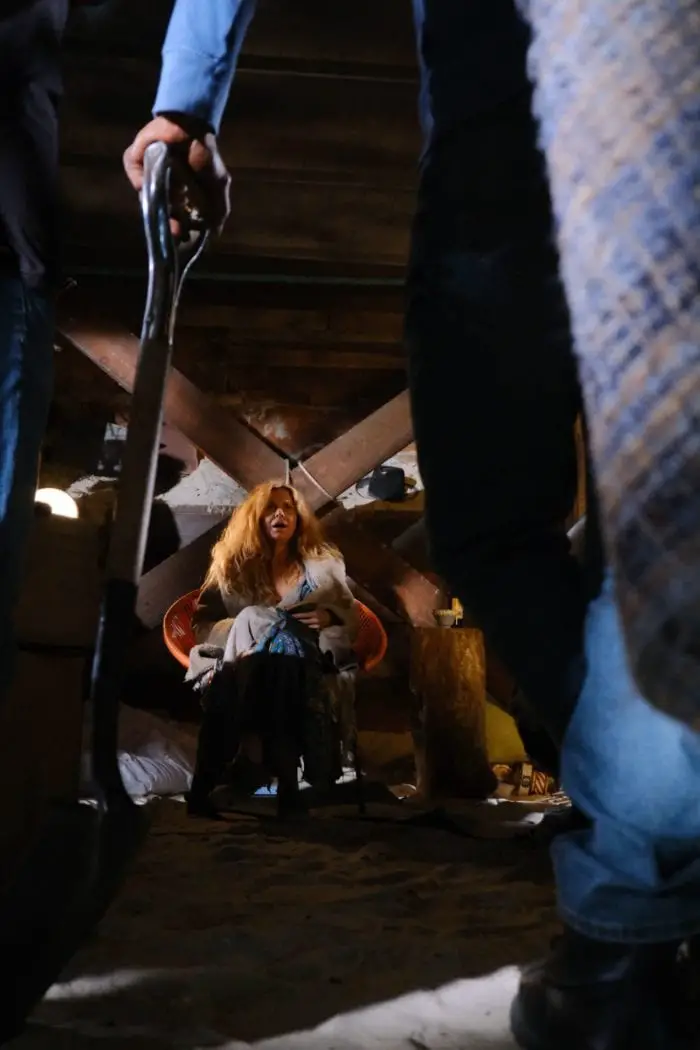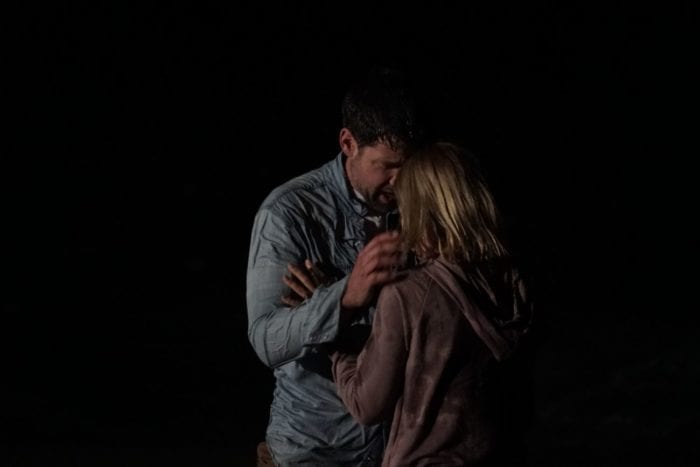Mena Suvari and Todd Grinnell star as house-flipping construction couple Tracey and Knox Barrett. The couple is on their way to Malibu, setting their sights on remodeling a beach house that previously belonged to Knox’s mother, who recently passed away after a fire broke out at the house. We watch as the couple receives the keys and begins cleaning up what could be considered a hoarder’s paradise with a “six-million-dollar view.” Dreaming about making enough money to finally settle down into domestic bliss, the couple talks about the future like bank robbers getting their cut of a big score. Knox and Tracey even consider omitting the payday and staying, doing the work by themselves, and raising a family in the idyllic seaside location. When Knox goes out to get wine to celebrate the first day in their new home, he receives a confusing warning from the wine store clerk about whether or not he’s met a woman named Bree (Kristin Bauer Van Straten).
While Knox is away, Tracey hears a rattling and goes to investigate, finding a hose turned on and snaking its way down the back stairs towards the beach. Later in the evening, Knox investigates another disturbance and finally has a run-in with the free-spirited Bree, who appears naked under the property’s beach shower. Apparently, Bree is their homeless tenant, living in a small area underneath their house on the beach. The police are called and basically tell Knox and Tracey that they’re not going to do anything about their homeless problem but to watch out for Bree because she’s not like most—a warning that sure sounds ominous even if it’s played off as harmless.

I just kind of clamped up here. I wasn’t sure where this movie was going, and the film was making me a bit uncomfortable. I originally thought I’d be getting more of a Cold Creek Manor or The Intruder type of scenario and was now setting foot into a homeless horror exploitation scenario. It’s hard to be about 20 minutes into a horror film and have your social conscious kick in. The good part is that Bree is particularly sharp and clever. Van Straten’s performance brings the right amount of menace to what would otherwise be a one-dimensional character. Her delivery in an early scene regarding the fragility of nature offers some bohemian intimidation to the situation—if you can believe an aggressive hippie to be something possible outside of fellow exploitation film I Drink Your Blood.
Bree drops some subtle hints as to why she’s taken a particular liking to the Barretts’ new home until writer Sherry Klein thankfully decides to abandon what feels like was almost a longwinded reveal. It becomes pretty obvious early on through Bree, prior to the characters googling her story, is squatting under the house Knox’s mother stole out from under her by paying the property taxes on the land and claiming “Squatter’s rights,” proving the story to be a literal interpretation of both the law and a metaphor.
From this point forward, Bree’s only job is to provide a thick air of chaos around the Barretts’ reconstruction effort as the rest of the story becomes a cumbersome, uncommitted tale about how to evict a homeless person. The film comes off with the extremely arrogant tone of “Sorry, not sorry” in the way it presents the Barretts as half-hearted sympathizers for what is clearly a hard-fought emotional and mental struggle for Bree. Everything they do to “help” is mainly out of rich-person guilt, and whenever they attempt any form of kindness, it’s shrouded in superiority, offering a wad of money or getting Bree a cup of water from the yard hose and not the inside tap. Sure, Bree is psychotic. She sneaks through the Barretts’ house, pulls some Fatal Attraction inspired tricks, and then there are all the people that begin to get hurt and go missing. Still, the Barretts never come across as likable people, and given Kristin Bauer Van Straten’s performance, Bree becomes the easier person to root for.

There are only about a million plot holes and ridiculous problems with everything that transpires to this point, from the lack of police involvement to a baffling love triangle, Tracey’s character seemingly being pushed out of the movie, and Bree basically soliciting other homeless people in her efforts against the Barretts. It could have proven fit for B movie midnight showings if it didn’t play itself so deliriously serious to the extent it feels like it’s taken a firm stance against homelessness. The final scenes of the film offer little to no fulfillment with Bree’s resolution being either peaceful or problematic depending on your interpretation.
Paradise Cove is a bit on the oblivious side in the way its ideas are presented, advocating more like a reason to remove the homeless from upper-class “six-million-dollar views” by presenting a cautionary tale of the what if variety. Some of the ideas seem almost opposite that of Jordan Peele’s Us, in which homelessness is represented by locked away “shadow people” that live underneath the Santa Monica pier and how Hands Across America failed in compelling people to consider their ignorance for the issue. Paradise Cove is certainly far from the nuanced approach of Us. Even when it tries being informative about how far the closest shelter to Malibu beach is or the population of homeless people in LA county, it refuses to present itself in an empathetic manner, more giving the feeling that its factual estimate of 58,000 homeless people are ready to storm the private beaches than purporting a real-world problem that requires addressing.

From a technical standpoint, the film doesn’t have a lot of ground to stand on, either. Voice-over dubs are uneven, and green screen use along with short-form shots make it obvious characters are on a set at times. Director Martin Guigui—whose most notable claim to the chair before this was a half-baked 9/11 starring Charlie Sheen that most of you either vaguely recollect or are just now finding out existed—has directed a very high-quality Lifetime film in Paradise Cove, something that will go great in between Killer Contractor and Fatal Flip on a Saturday afternoon.
Kristen Bauer Van Straten really is the film’s only saving grace. I thought she was great as Eric’s (Alexander Skarsgård) cynical leather-clad vampire progeny, Pamela Swynford de Beaufort, on True Blood, and it’s good to see her again after her role as Maleficent came to an end with Once Upon A Time… Though Paradise Cove may not have been the kind of social commentary film it could have been, I do hope Van Straten gets to come back and play in the psycho sandbox again someday…maybe next time without the sand, in case you’re under the impression the metaphor has to be literal.
Paradise Cove invades your home via VOD on February 12.



